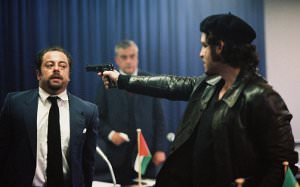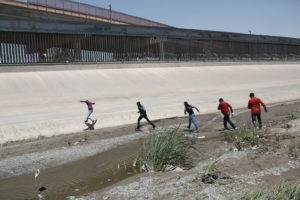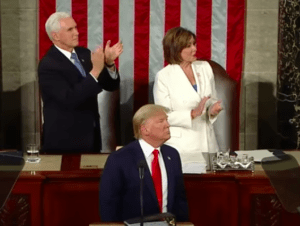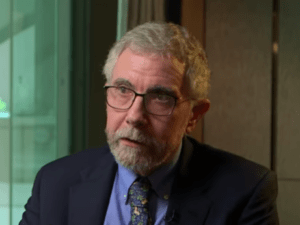‘Carlos’: A Different Kind of Terrorism
“Carlos” is a fictionalized but persuasively believable biography of celebrity terrorist Ilich Ramirez Sanchez, a man known for his indolence as well as support for a whole gamut of revolutionary causes.
“Carlos,” the fictionalized yet persuasively believable biography of Ilich Ramirez Sanchez, celebrity terrorist of the 1970s and ’80s, comes to us in two sizes: There’s the full-ride version, made for television with a running time of more than five hours, and there is a three-hour film that will doubtless have somewhat more theatrical play. As it happens, I volunteered for the longer presentation, and I’m not sorry I did. My guess is that it is somehow truer to the terrorist’s life—huge amounts of boredom relieved, from time to time, by intense activity (bombings, shootings, hostage-taking)—than the lite version might be.
Carlos is portrayed, in a very good performance by Venezuelan actor Edgar Ramirez, as a man given at least as much to indolence, boozing, sexual adventuring and chain smoking as he is to the wide variety of revolutionary causes he embraces over the course of his 20-year career. He is also, and this may be the most crucial aspect of his character, a man basking in his own celebrity — the heady fact that his “Carlos” pseudonym strikes unreasoning fear in the hearts of the general public, though not so much in the minds of state security operatives, particularly those behind the Iron Curtain and in the Arab world. They are mostly too busy trying to strike deals with him for the use of his talents and those of his fellow conspirators.
The movie reminds us that the high point of Carlos’ career occurred in December 1975, when he invaded a meeting of OPEC’s oil ministers in Vienna, threatening to kill the Saudi representative, then flying everybody hither and tither in Africa, seeking someplace that would ransom the officials. That finally occurs, and this long and suspenseful sequence, masterfully orchestrated by director Olivier Assayas, is in a couple of senses the heart of the film. In itself it is creepily electrifying cinema. But it is also the moment, I think, in which Carlos begins to perceive there is good money to be made in the terror game.
It takes him a while—essentially the last third of the movie—to fully embrace this cynicism, but after much packing and running (and failed deals for his services) he ends up lolling about in Khartoum, a fully burnt-out case, ripe for the plucking by the French secret police. Since 1997 he has been serving a life sentence for the murder of two police agents.
Movies like “Carlos,” in which we can’t help but identify with the trials of essentially murderous thugs, always present a problem. We become invested in, even sympathetic to, their adventures, both muscular and domestic. It is hard to remember much of the time that Carlos and his gang represent values that are entirely antithetical to our own, that much of the collateral damage they inflict is on peaceable, non-ideological bystanders and that even their sworn enemies are generally just people doing their bureaucratic jobs.
Assayas, however, keeps a cool, objective distance from the terrorists. They have no charm and no humanizing waywardness, but neither are they fully monstrous. They are fairly dull people doing their jobs in ever-threatening circumstances. Nor does his film offer anything like a revolutionary rationale for their activities. Carlos occasionally alludes to the worldwide revolutionary struggle, but that’s not much more than rhetorical window dressing. At heart, the guy is just a psychopath, kind of like the mastermind criminals we don’t see much in the movies anymore. But with this difference: He’s operating in a world where the media mindlessly magnify his prowess, which for a time at least also magnifies the profitability of his activities.
You emerge from Assayas’ film thankful for his essential French rationalism, his refusal to buy into easy explanations for the behavior he so patiently records. One is often struck by the affectlessness of Carlos and his followers. They are quite literally pitiless, but they never bring that state of mind to the fore. They just go about their business in a businesslike way, and if they get testy with one another it is almost always about personal issues—especially, late in the film, when Carlos, a married man and a father, sunders his marriage by his ceaseless (and rather dispassionate) womanizing.
I can’t leave this film without recording my admiration for the effort it demanded: years of research; a 300-page script; a six-month shooting schedule, much of it in places where the events depicted actually took place; the sheer epic scale of the work, which (perhaps the OPEC kidnapping aside) mostly takes place quietly, in quotidian settings, with small groups of people speaking softly of horrendous activities. What the director wants to tell us, I think, is something we don’t particularly want to hear — that terrorism, though a rare impulse, and one that is carried out by fringe personalities, is yet a normal—that is to say, quite a banal—human activity. That is likely the scariest thing about it—the source of its occasional power, but also the source of the impotence that “Carlos” conveys. None of his crimes affect the course of our public life.
At the end of his day, Carlos was in part brought down by a minor testicular ailment, which he delayed curing because—vanity, vanity—he was also contemplating liposuction to address the fact that in his idleness he was now running to fat. The enemy even of perverse heroism is always encroaching middle age. Carlos was 45 when they nabbed him.
Your support matters…Independent journalism is under threat and overshadowed by heavily funded mainstream media.
You can help level the playing field. Become a member.
Your tax-deductible contribution keeps us digging beneath the headlines to give you thought-provoking, investigative reporting and analysis that unearths what's really happening- without compromise.
Give today to support our courageous, independent journalists.






You need to be a supporter to comment.
There are currently no responses to this article.
Be the first to respond.